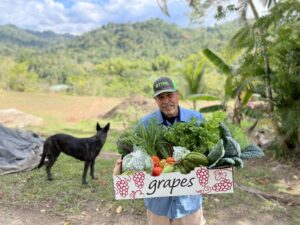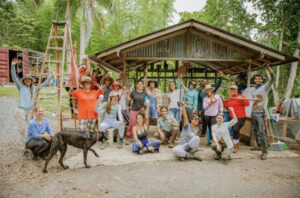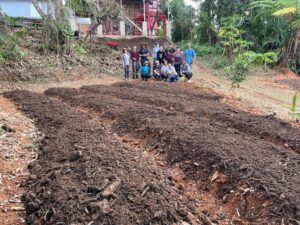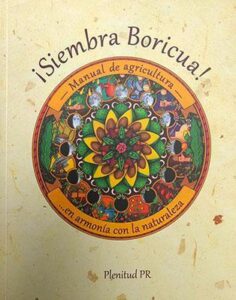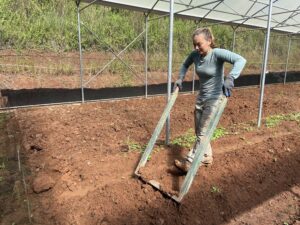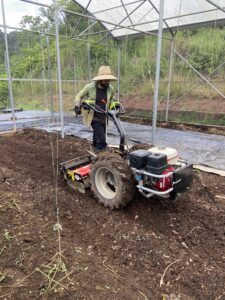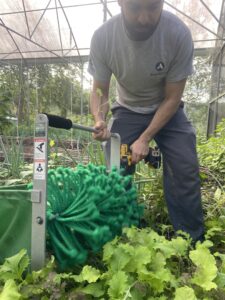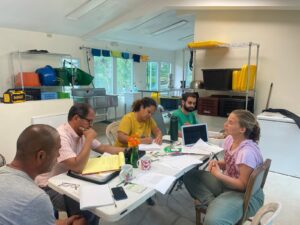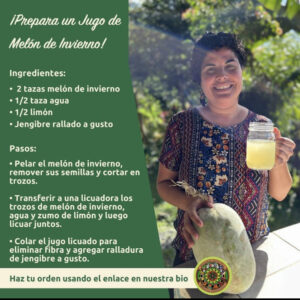Project Overview
Information Products
Commodities
Practices
- Education and Training: mentoring
- Sustainable Communities: local and regional food systems, new business opportunities, quality of life, sustainability measures
Abstract:
In Puerto Rico, over 90% of food is imported. Furthermore, the last Puerto Rico Agriculture Census (2018) shows that the average age of farmers in our mountainous region is 60+, with most farmers utilizing conventional farming practices that degrade soil quality, increase erosion, and limit biodiversity. There is a need for a new generation of growers that can increase food security in Puerto Rico, create new livelihoods, and improve the health and quality of life for our communities. However, the complexity of the current social, political and economic climate limits opportunities to acquire resources, support and education investments to move forward. Challenges have been exacerbated by the devastation of farms and infrastructure caused by hurricanes in 2017, earthquakes in 2020, and the Covid-19 related economic crisis. The urgency and need is even greater in the marginalized and impoverished communities of the central western mountain region where Plenitud PR is located. Plenitud PR proposed a project that offers an alternative strategic model through the strengthening and expansion of experiential education training and one-on-one programs in agroecology for participants local to the central region. The team of talented agronomists, investigators, and educators involved have led educational programs impacting more than 600 aspiring/beginner farmers over the last 10 years, and have distributed over 5,000 copies of a unique Spanish-language sustainable agriculture book that serves as an educational tool for farmers and home gardeners in the tropics.
The 2020-2022 project evaluation demonstrated that:
- Small-scale sustainable farmers need more intensive mentoring, marketing resources and opportunities in order to successfully launch profitable micro-businesses.
- Consumers need more awareness on the importance of supporting local sustainable farmers and Food Access and Literacy (FAL).
This year’s project included not only a second iteration of our previous year’s educational programming (5-month apprenticeship program impacting 42 beginner farmers, a 6-month mentorship program to impacting 4 participants, and a 2-7 month internship program impacting 8 beginner farmers), but it also expanded to include an Agro-ecological Incubator for Small Businesses impacting 6 limited-resource and/or women farmers. In this program they received additional market gardening training and efficiency tools; they also gained more technical and legal support at their production sites. In this new project, small sustainable farmers were also provided stipends and resources to be able to take the time to discuss needs and collaboration opportunities and get additional technical support.
Additionally, we expanded our outreach efforts with educational material for both farmers and consumers; we have revised and expanded our current educational materials based on feedback from course participants on agricultural practices, crop planning and maintenance tools as well as developed FAL content to increase sales for farmers in the region. We also further tested and and continue to improve the second edition of our Spanish-language sustainable agriculture manual and developed better marketing and distribution systems.
Through this project, Plenitud PR sought to deepen impact on beginning farmers through programs that will increase their success and profitability, and through a multi-pronged educational and marketing campaign increasing consumer demand for local produce to advance sustainable agriculture in the region.
Project objectives:
- Offered a 2 part 260-hr. Market Gardening Incubation experience, with the technical assistance of Voz Activa partners, to start up small scale market garden businesses or improve existing operations for 6 limited - resource and/or women farmers who have previously completed our sustainable agriculture training or are partner beginner farmers. They participated of incubation sessions with a stipend to:
- Received professional assistance and tools to prepare a crop plan and business plan
- Received technical assistance in design and infrastructure development
- Received the basic tools and materials to begin production
- Received marketing support and access to the Plenitud PR food hub as an initial or additional sales channel
- Receive financial and legal support
Here is a full report on their outcomes and growth.
- Tested and improved the second edition of our spanish sustainable agriculture book titled: !Siembra Boricua!: Manual de agricultura en armonía con la naturaleza while continuing to distribute the first edition. In the last 2 years, we tested the first edition of this book and received positive feedback on the need for this tool and its effectiveness. After making the necessary improvements and creating new tools (links in Educational and Outreach Activities section) to accompany this resource.
- Tested and trained beginning farmers with key small scale farm tools that maximize efficiency and economic viability.
Tools included:
- Two wheel tractor with implements (rotary plow, power harrow and flail mower) for easier and sustainable soil preparation.
- Broadforks for more sustainable soil preparation
- Silage tarps used for efficient weed control
- Precision seeders for quicker planting and seed saving
- Stir-up hoes for quicker and ergonomic weeding
- Flame weeder
- Greens harvester
- Crop planning templates to simplify planning and organization and intensify small growing spaces for profitability.
We created an efficiency tools resource after testing these tools for farmers and offered training opportunities on how to use them.
- Small Sustainable Farmer Collaboration Program - We incentivise 4 small scale farmer meet ups with 6 participants to initiate dialogue and collaboration. This was facilitated by our partner organization Voz Activa, who are professionals facilitating open dialogue, in order to identify needs and opportunities sharing resources and costs. We also reserved funding to catalyze collaborative projects generated from the dialogues and/or technical or legal support needed to advance their efforts. Farmers received a stipend for every gathering attended. We also organized volunteer hours at each farm during the course of the grant to support labor and deepen relationships with the farming community.
With external funding we also continued our previous year’s objectives:
- Developed Food Access and Literacy (FAL) content to increase sales for farmers in the region and improve previously created educational material based on feedback from course participants on agricultural practices, crop planning and maintenance tools. We created social media templates to present simple educational material to the general public and recipes to use with local production.
2. Continued our educational programing which includes our apprenticeship, mentorship and internship (Intensive Agroecology training).
3. Continued advancing the Plenitud PR farm operation which serves as our main laboratory and educational tool.
These lead and supported the objectives of this project to further sustainable agriculture in Puerto Rico.
